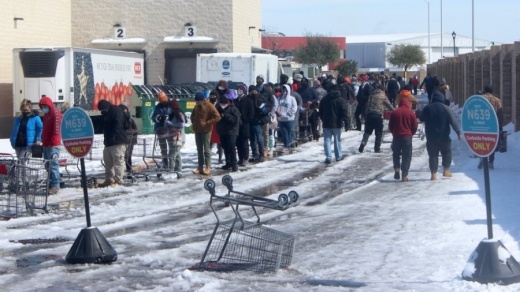Editor's note: This story has been updated to include a response from the city.
A new report from the city auditor's office details several ways Austin came up short in its response to Winter Storm Uri last February despite years of previous warnings and recommendations.
The draft audit report, released Nov. 8, is the latest of several city reviews of the winter disaster to be released this month. City Council previously heard after-action briefings from Austin Energy, Austin Water and the city's office of emergency management on Nov. 4. Council will also consider the new report during its Nov. 10 Audit and Finance Committee meeting.
The findings from City Auditor Corrie Stokes' office cover Austin's reaction as temperatures dipped and power systems failed.
The report also delves into overall shortcomings in city preparations for severe winter weather events, insufficient communication with residents before and during the disaster period, and Austin's inequitable planning structure.
"While the storm was exceptionally severe, the city’s lack of preparedness for Winter Storm Uri led to a less effective and disorganized response. Additionally, the city has not implemented many past recommendations that may have improved its response to the storm, and has not historically prioritized disaster preparedness or community resilience," auditors said.
In a statement, the city said the findings of the audit and after-action reports released last week will guide Austin's approach to bettering its disaster response.
"As we said just a few days ago, the city of Austin, like the state of Texas, was unprepared for a historic natural disaster layered on top of an international public health crisis. But we came together as a community to help each other," a city spokesperson said. "With every unprecedented event like this, there are lessons to be learned about our preparation, planning and response. We intend to learn those lessons and make improvements, and many of those improvements are already underway."
The findings
The audit team found that, leading up to mid-February, the city was understaffed, undersupplied and did not have necessary accommodations for residents seeking food and heat. City staff were "exhausted" through the process and the rollout of shelter spaces proved to be "chaotic."
Some of those failures may stem from Austin's flawed citywide strategy for such situations, the report found.
The city's Emergency Operations Plan references the possibility of major disasters but does not feature "specific details about managing them," auditors found, and is lacking with regards to winter weather and related power and water issues.
That finding came despite years of previous guidance pointing to a need for improved winter disaster planning, whether from a 2011 audit report or a 2020 emergency training session centered on winter events, the auditors found.
"The city has not acted on many lessons learned or recommended actions to improve disaster preparedness and response. The city also has not prioritized or funded disaster preparedness and community resilience," auditors wrote.
While noting that the city did not know how extreme the storm could turn out, and that state-level information on widespread power outages came "too late to be useful," auditors said Austin should have readied residents for how bad things could get.
Once Uri hit, Austin also did a poor job of keeping residents—particularly non-English speakers—informed of potentially life- or property-saving updates, the auditors found.
"If the city had communicated better preparedness information early on, residents may have been more prepared by the time widespread power and water outages began," auditors said.
Travis County recorded the second-highest death total of all counties in the state with 28 deaths. Of those, 21 occurred within Austin. The majority were elderly or experiencing homelessness, the report found. Next steps
The report concludes with a series of 10 recommendations for improving all aspects of Austin's disaster response systems.
Proposals range from increased training for city staff, addressing emergency recommendations ignored in previous years, and stockpiling supplies and equipment needed to provide for residents in the future.
City staff agreed with the majority of the audit office's sentiments and laid out plans to address each point. Future council discussions will also likely result in action following up on this month's reviews.
Auditors said a key preparation is an expansion of Austin and Travis County's network of "resilience hubs," or self-contained neighborhood gathering places for resources and shelter amid a disaster.
Resilience hubs can be located in schools, libraries or recreation centers.
The city, county and Austin ISD are pushing to increase the number of such community spaces, although the area is a long way from reaching the estimated 400 hubs needed to make such facilities accessible from any neighborhood in Austin. Austin dedicated $3 million in federal relief dollars to the establishment of two resilience hubs over a two-year pilot period this year.





